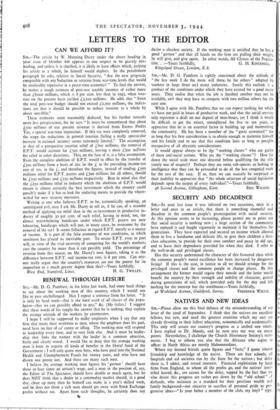LETTERS TO THE EDITOR
CAN WE AFFORD IT ?
Sia,—The article by W. Manning Dacey under the above heading in your issue of October 6th appears in one respect to be gravely mis- leading, and unless it is clarified, it is likely to have effects which, judging his article as a whole, he himself would deplore. In the penultimate paragraph he asks, relative to Social Security, "Are the new proposals compatible with any ?eduction in taxation from war-time levels that would be intolerably repressive in a peace-time economy? " To find the answer, he makes a rough estimate of post-war taxable incomes of rather more than £8,00o millions, which is 8 per cent. less than in 1943, when taxa- tion on the present basis yielded £3,Ioo millions. He adds that " Since the total post-war budget should not exceed £2,300 millions, the indica- tions are that it should be possible to reduce taxation as a whole by about one-fifth."
These estimates seem reasonably deduced, but his further remarks seem less perspicacious, for he says " It must be remembered that about
£500 millions of our present revenue is derived from Excess Profits Tax, a special war-time imposition. If this tax were completely removed, the scope for reductions in general taxation (failing a really spectacular increase in national income) seems extremely limited." The assumption is that of a prospective taxation relief of £800 millions, the removal of E.P.T. would account for £5oo millions, leaving a mere £300 millions for relief in other directions. This, on the face of it, is a false assumption. Even the complete abolition of E.P.T. would in effect be the transfer of £5oo millions from a basis of 20S. in the £ to the prevailing income-tax rate of tos. in the £, and therefore the figures, instead of reading £500 millions relief for E.P.T. payers and £300 millions for all others, should be £250 millions and £55o millions respectively. Bear in mind also that the £250 millions relief to industry which the abolition of E.P.T. would ensure is almost certainly the best investment which the country could possib'y make if it has to look for enduring means to provide the where- withal for new security measures.
Writing as one who believes E.P.T. to be, economically speaking, an unmitigated evil, may I ask Mr. Dacey to tell us, if he can, of a sounder method of applying tax relief than in the re-investment in productive in- dustry of roughly 3o per cent. of such relief, having in mind, too, the almost overwhelming handicaps under which E.P.T. payers are now labouring, handicaps which will not, in many cases, be overcome by the removal of the tax? It seems fallacious to regard E.P.T. merely as a source of income. It is part of the false economy of war conditions, in which sentiment has p'ayed its inevitable part. To retain E.P.T. even in part will, in view of the vital necessity of competing for the world's markets, cost the country far more than it can possibly yield. The percentage of revenue from this source, on Mr. Dacey's own figures, taking it as the difference between E.P.T. and income-tax rate, is B per cent. Can any- one really argue that the country's resources are not the poorer for its imposition to a much greater degree than this?—Yours faithfully,


























 Previous page
Previous page